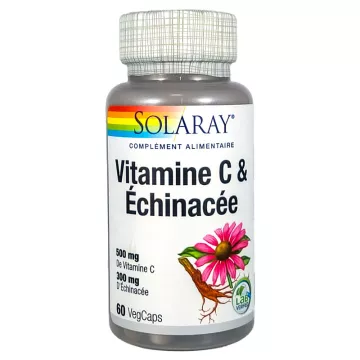Need a helping hand to stay in shape all year round? Echinacea, a medicinal plant emblematic of Amerindian traditions, is now part of your wellness routine. On Soin-et-Nature, explore a selection of products based onEchinacea purpurea, a plant recognized for stimulating natural defenses and shortening the duration of winter infections. Available as drops, capsules or standardized extracts, it can be adapted to every need, whether you wish to prevent cold snaps, soothe a sensitive throat or simply boost your immunity on a daily basis.
More details
Native Americans (South Dakota) used this plant to heal infected wounds, and as a local application for snake bites. To use it, they crushed the fresh plant and applied it locally, or chewed the root. The name Echinacea derives from the Greek echinos, meaning "hedgehog", and refers to the spiky flower head. Purpurea is Latin for purple, a purplish-red color.Echinacea was one of the main medicinal plants of the indigenous peoples of North America, particularly the Cheyenne, Oglala Lakota, Kiowa, Crow, Omaha, Pawnee, Poncas, Teton, Delawares and Comanche. They used the juice or porridge from the crushed herb or chewed pieces of root. Decoctions were rarer.
It is assumed that the natives did not differentiate between the various types of Echinacea, but used the kind that grew in the region where they lived. The white settlers of North America adopted echinacea as a native remedy. As early as 1737, a description of the plant and its medicinal properties can be found in John Clayton's "Catalogue of Plants, Fruits, and Trees Native to Virginia". Known as "Black Sampson", echinacea was later mainly used as a universal remedy in folk medicine. In 1852, E. purpurea was cited for the first time in the "Ecclectic Dispensatory of the United States", praising its effectiveness against syphilis. Around 1869, H.C.F. Meyer produced and sold in Pawnee City the first pharmaceutical speciality under the name of "Meyer blood depurative".
Echinacea's popularity grew, as did the number of glowing reports about it. However, in 1909, echinacea was not recognized as effective enough to be included in the list of "New and Non-Official Remedies". In 1911, the first complete pharmacognostic study of E. angustifolia was published, with numerous microscopic illustrations. By the 1930s, echinacea was gradually losing interest in the USA, and fewer and fewer articles were published. In Europe, interest in echinacea only began in 1897. Clarke described its clinical success in detail in his "Dictionary of Practical Materia Medica", published in London in 1900.
A homeopathic pharmacological survey was published in 1906, and in 1924, E. angustifolia appeared in Dr. Wilmar Schwabe's "Homöopatisches Arzneibuch" (homeopathic pharmacopoeia). Stauffer and Madaus were pioneers in the use of echinacea in Europe. Since then, the various types of Echinacea have been extensively studied from morphological, pharmacological and clinical points of view. The most comprehensive documentation concerns E. purpurea. A. Vogel discovered Echinacea purpurea in the early 1950s during a cross-country trip that took him to South Dakota, among other places. He befriended Black Elk, the chief of the Oglala Lakota, who introduced him to the healing arts of his tribe and gave him a gift of echinacea seeds. The resulting plants formed the basis of his own experiments with echinacea, which became an essential plant for Alfred Vogel.
Echinacea is a plant with multiple benefits, particularly recognized for its action against winter ailments. Not only does it reduce cold symptoms such as nasal congestion, coughing and sneezing, it also helps to shorten the duration of the infection.
Thanks to its immunostimulant properties, echinacea naturally boosts the immune system, helping the body to better defend itself against seasonal viruses. It is also useful for relieving persistent sore throats and soothing irritations. In addition, this medicinal plant is effective for soothing localized infections in the ENT sphere (nose, throat, ears), offering natural support in cases of sinusitis, pharyngitis or the onset of angina.
Acutely:
The flowering and underground parts of Echinacea purpurea are on List A of the French Pharmacopoeia.
Soin-et-Nature offers a comprehensive range of food supplements to boost the body's natural defenses and support your immune system. Here are the main categories available:
These dietary supplements for natural defenses, available on Soin-et-Nature, are specially designed to protect your body, boost your immunity and improve your resistance to external aggression.